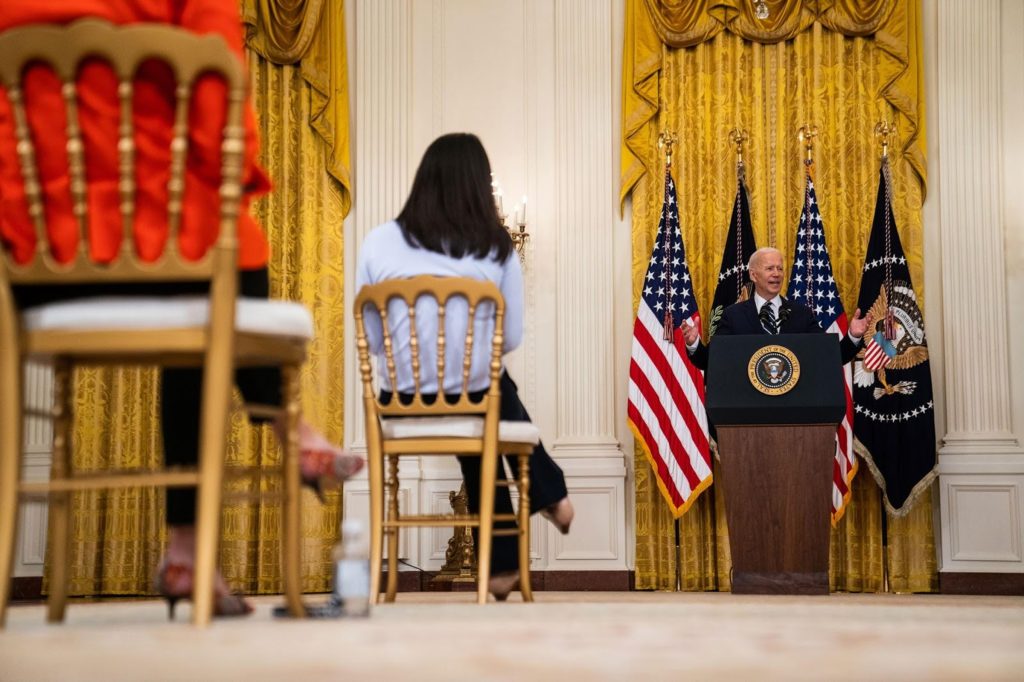Biden Holds First Press Conference of Presidency

Image Courtesy of Time Magazine
By Jeremy Perillo
Roughly 64 days after being sworn in as President of the United States, Joe Biden held his first press conference in the East Room of the White House. The President addressed a range of topics from his re-election plans to how his administration is attempting to remedy the immigration hurdles the country is facing.
President Biden started the press event by announcing the change in his 100 million shots in his first 100 days plan, to 200 million shots within the same time frame. The administration reached the original achievement the week before the press conference, after only fifty-eight days in office. As of March 30, 131 million shots have been administered, giving the president thirty days to reach the remaining sixty-nine million shots.
Biden utilized the opportunity to tout the passage of his American Rescue Plan and the benefits the relief that it will offer everyday Americans as the country continues to weather through the pandemic.
Despite the administration’s focus on the coronavirus, the president was not asked any questions about anything related to covid-19 by members of the press. Topics like immigration, the viability of the administration’s other priorities, and Republican opposition to pieces of legislation dominated the question and answer portion of the press conference.
“I got elected to solve problems,” Biden said when asked if his legislative priorities would be able to see actionable success. “I think my Republican colleagues are going to have to determine whether or not we want to work together or decide that the way in which they want to proceed is to — is to just decide to divide the country, continue the politics of division, but I’m not going to do that.”
Arguably one of the most pressing issues for the administration is immigration and the crisis at the southern border. Biden was pressed about his messaging acting as a contributor to the massive influx, to which he pointed to the cyclical nature of migrants showing up to the border. He was also asked about the horrifying statistics and images coming out of the U.S. border facilities, to which he said the conditions were “totally unacceptable”
Following the tragic mass shootings in Atlanta, GA, and Boulder, Co, the president was asked about gun control as a priority for the administration. The president strongly urged Congress to work on gun control measures, but was not quick to present plans for his own legislation. Despite campaign promises that he would send a bill to Congress closing background check loopholes and repealing liability protections for gun manufacturers, the president remained steadfast that he is continuing to pursue infrastructure as his next priority.
The president seemingly changed his tune on the filibuster, a mechanism of the Senate he has staunchly defended during his time in office and beyond. Likely after noting partisan resistance from Republicans on his proposed legislative proposals, Biden might be open to changing the controversial rule.
“If we have to, if there’s complete lockdown and chaos as a consequence of the filibuster, then we’ll have to go beyond” reinstating the ‘talking filibuster,’ Biden said.
Biden also shined some light on the administration’s stance on a full troop withdrawal from Afghanistan by the Trump-approved date of May 1. While reluctant to agree to that timeframe for “tactical reasons,” the president added that he does not expect them to be there next year.
The press sought some clarification on the president’s election plans, as he has still not filed for re-election, unlike Trump who had filed in January 2017. He said that it is his “plan to run for re-election” and that it’s his “expectation” to run again. He brushed off questions about Trump as his potential opponent but did confirm he is “expecting” to have VP Kamala Harris as his running mate once again.
The one-hour and eighteen-minute press conference was important in the sense that it allowed the American public to see where their president stands on policy questions/decisions since taking office. As it goes, things happen and action and accountability are required from government officials. The question now becomes, when will the next presidential press conference occur?







